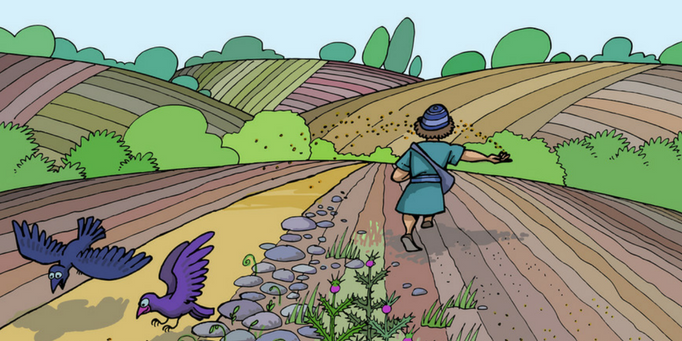
Approaching the thorns and troubles of life
Looking at the Parable of the Sower, how can we focus our energy and deal with the obstacles and troubles of life?
Have you ever been challenged by a sermon about things you want to change? Or talked to a friend about the sort of person you want to be, but left the conversation feeling demoralised? “Well, it’s all very good to tell me I need to do X, Y and Z, but how do I actually do that?”
Today, I’m talking about how to focus your energy and deal with the obstacles that get in the way.
The challenge – who are you? What do you want?
A few months ago, our church was challenged with the Parable of the Soils (Matt 13), where the question was not so much what sort of soil you are, but what sort of soil you want to be. When trouble comes because of the Word, will we quickly fall away? Are we people who love the Word, but are unfruitful because the worries of this life and distractions of consumerism and the lure of wealth choke its expression out of our lives? Or are we people who hear the Word, put it into practice and “produces a crop, yielding a hundred, sixty or thirty times what was sown”?
The automatic answer for most of us is that we want to be the “good soil”, productive and active in God’s Kingdom work. We know that “we are God’s handiwork, created in Christ Jesus to do good works, which God prepared in advance for us to do” (Eph 2:10). But honestly, many of us can’t help but be distracted with daily worries or consumer goods or financial pleasures or the search for security. I’ll put my hand up right now to say that I often use consumer goods as distractions against the wear and tear of just trying to get the kids out the door for school every morning without losing my temper (Facebook, anyone?).
In my experience, the following six steps can all help when dealing with the thorns or troubles of life, and cultivating your heart for the Kingdom.
1. Recognise what it is you value
When you can be clear about what “big picture” qualities you want to bring to the world around you and embody in yourself, it is much easier to identify specific ways you can live them out every day. (This will take time, but it will be time well spent. See here for examples and a structure to work them out.) When you attempt to live them out, that recognition rewards and reinforces your original value, to the point where it becomes a self-sustaining loop between value and action. Maybe you value kindness, self-control, compassion, or exploring the world around you. Every time you act that out (e.g. by going for a walk, saying a kind word to the check-out staff at the supermarket, holding your temper for just 5 seconds longer, not buying that lovely dress you don’t need), the realisation that you are living out some aspect of your values has the power to motivate you to keep going.
2. Focus on the Kingdom
If you value God and His Kingdom and His people, be clear about that. What particular qualities about God catch your eye? What things about His people catch your heart? Look at your skills, your talents, the things you choose to do to relax and to connect with others, the things people comment on in you – these can be clear indicators of how God has wired you and what work He has prepared for you. How do you want to bring that to the world around you? What good works are waiting for you? (Note well, dear reader – those good works will be based around people, not programs. Reframe tasks in terms of the people the tasks benefit. Their lives are more important than what they can contribute – it’s not like Jesus came to set up rosters.)
3. Be open and aware – and put the weed-whacker away
You need to be able to be aware of what’s happening in the present moment, open to not just what you’re experiencing but what is going on in the world around you. If you are shutting some part of yourself down, or feeling like you have to eliminate your difficult thoughts or feelings with a psychic weed-whacker, two things are happening: 1. you’re shutting out a world’s worth of information and opportunities to learn and grow and contribute; and 2. you’re setting yourself up to fail. Research shows that when we try to suppress or avoid an unpleasant thought or emotion or sensation, the act of suppression can actually make the experience happen more intensely, more frequently, or both. And if we are feeling a certain way when we try to suppress the experience, then the next time we feel that way the unpleasant experience is more likely to come back. So basically, the times when you most want avoidance or suppression to work, are the times when it is most likely to fail.
4. Deal with the thorns
So the way to deal with the “thorns” is through a kind of non-judgemental, self-compassionate awareness. Gently observe and label the “plant” that’s producing them. Put the weed-whacker down. If you’re struggling (and everyone goes through struggles), label the struggle. If you keep getting caught in a story your mind is telling you, notice the story and give it a name (for example, one of my frequently recurring ones is the “No one really cares” story). When you can feel your emotions rising up and getting in the way, or when you’re feeling the urge to do something inappropriate, take a minute to sit and breathe through the sensations (just like labour pains) - take the time to simply notice where the sensations are happening in your body (arms, jaw, neck, chest?). You are not your feelings. You are not your thoughts. You are not your sensations. You are an eternal being intricately interwoven with a magnificent electrochemical system embedded in a complex social support network, and you can choose to notice all of these things and then choose where to direct your energy and attention.
5. Learn from the thorns
One of the great things about these “thorns” is that, even when they get in the way of living out your values, they can still become triggers for helpful action. Imagine that someone is being really annoying and all you want to do is yell or walk away. If you can continue to remind yourself that being kind and self-controlled is what matters, in time, that rising, suffocating feeling of frustration and anger will itself remind you that you want to embody kindness and self-control, and prompt you to live that out instead of yelling and walking away.
6. Love God and others
We must remember that our God is a God of grace and mercy. We only have work to do because God made us alive in Jesus even though we were hopelessly broken. He knows how we work and how we are made. Our first task is to connect to Him. Maybe that’s all you can do for now. And that’s absolutely fine. Pick a way you can intentionally connect with Him this week that you didn’t do last week. If you can, pick a way to intentionally connect with people. Maybe it’s something you’re doing already – the crucial thing is that it needs to mean something to you. It must tie into your value network so that you can maintain it easily. Tell someone your plan and ask them to ask you about it every week (because, trust me, if you know someone is going to be continually asking you – non-judgementally, of course – “Did you do [task]”… well, sooner or later you’re simply going to want to be able to say “Yes!”). And whenever you brush up against those thorns, that’s okay – take a moment, breathe, put the metaphorical machete down, and label the “bush” that’s growing them. Then lift your gaze to the God who loves you, who wired you to value the things that you do, and have a word with Him about the next step you’re going to take.
Once a clinical psychologist, Krystyna Kidson had kids, fell in love with coaching and is now The Psychologist Coach and founder of the Paraclete Initiative, a stress mastery and burnout prevention ministry; coming alongside God’s people with practical, effective strategies that they can use to throw off that which hinders and be free to love and serve God and others more meaningfully, effectively, and sustainably.
For more articles from Growing Faith, subscribe to our monthly e-newsletter.
To hear about the latest books and resources from Youthworks Media, subscribe here.






